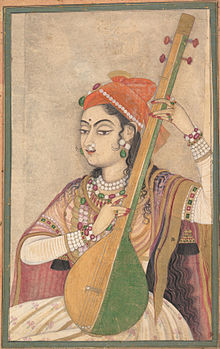Indian rock
| Indian rock | |
|---|---|
| Stylistic origins |
South Asian Indian music |
| Cultural origins | India, Bengal |
| Typical instruments | Vocals, Gramophone, Jazz, Indian musical instruments, Electric guitar, Bass guitar, Drums, Keyboard, Electric sitar |
| Music of India | |
|---|---|

A Lady Playing the Tanpura, ca. 1735 (Rajasthan)
|
|
| Genres | |
|
|
| Media and performance | |
| Music awards | |
| Music festivals | |
| Music media | |
| Nationalistic and patriotic songs | |
| National anthem | Jana Gana Mana |
| Regional music | |
|
|
Indian rock is a music genre in India that incorporates elements of Indian music with mainstream rock music, and is often topically India-centric. While India is more often known for its (northern and southern) classical music and Bollywood filmi music, the Indian rock scene has also produced numerous bands and artists.
India, in the 1950s and 1960s, uniquely amongst developing markets, had a record industry in the Gramophone Company of India (an RCA/HMV/EMI subsidiary), and LPs, EPs, and 45rpm records were freely available, including those of rock and roll acts from the USA and Britain, but also of contemporary pioneering Indian rock bands. The president of the firm, Bhaskar Menon (who later became the President of Capitol Records in the United States) was the leading promoter of Western pop music in India. Later in 1970, Polydor, the German Label, began an India label distributing rock music.
Of these mid-1960s to early 70s beat groups, as they were then termed, one of the most notable were the Mystiks from Bombay, the Beat-X from Madras, and the Flintstone from Calcutta, who composed and played both early British Invasion influenced songs, and post-Sgt. Pepper hard rock. Also, from Delhi, during this period, there were The Thunderbirds (featuring singer Ashwani Bali), and WAFWOT (also with Ashwani on vocals, with organist Mark Spevak, from the U.S.) These bands played regularly on the Indian university and college music circuits, and some had successful EP and LP releases. Also notable from this period (1964–1970) was the female R&B singer, Usha Iyer, now Usha Uthup, who had successful covers of "Jambalaya" and The Kingston Trio song, "Greenback Dollar". A notable compilation LP titled "Simla Beat '70" was released during this period, from a contest of the same name. The winning bands recorded their versions of Western hard rock of the time. This tradition of covering Western rock would continue until the 1980s, when it was more common to compose original songs.
...
Wikipedia
